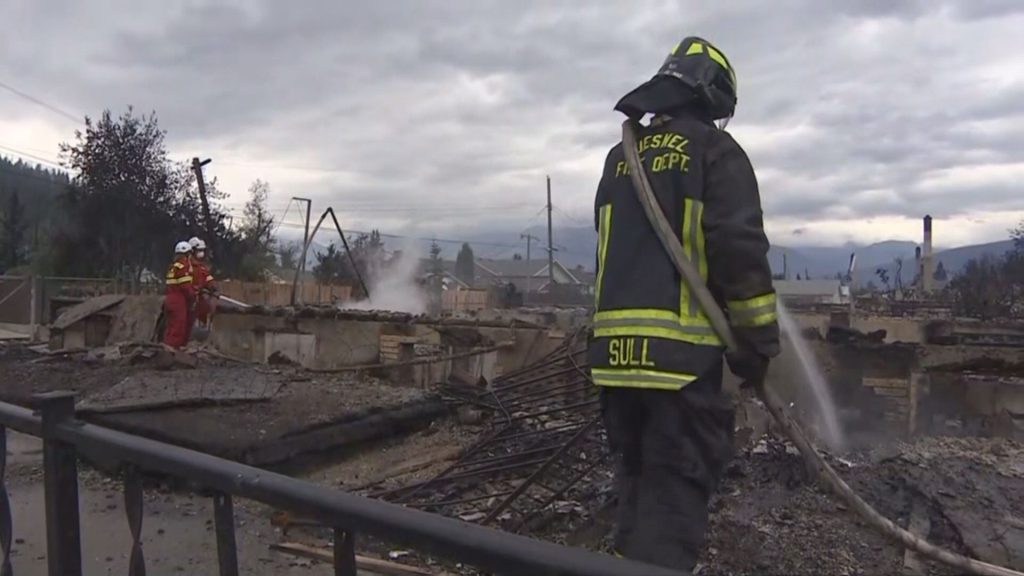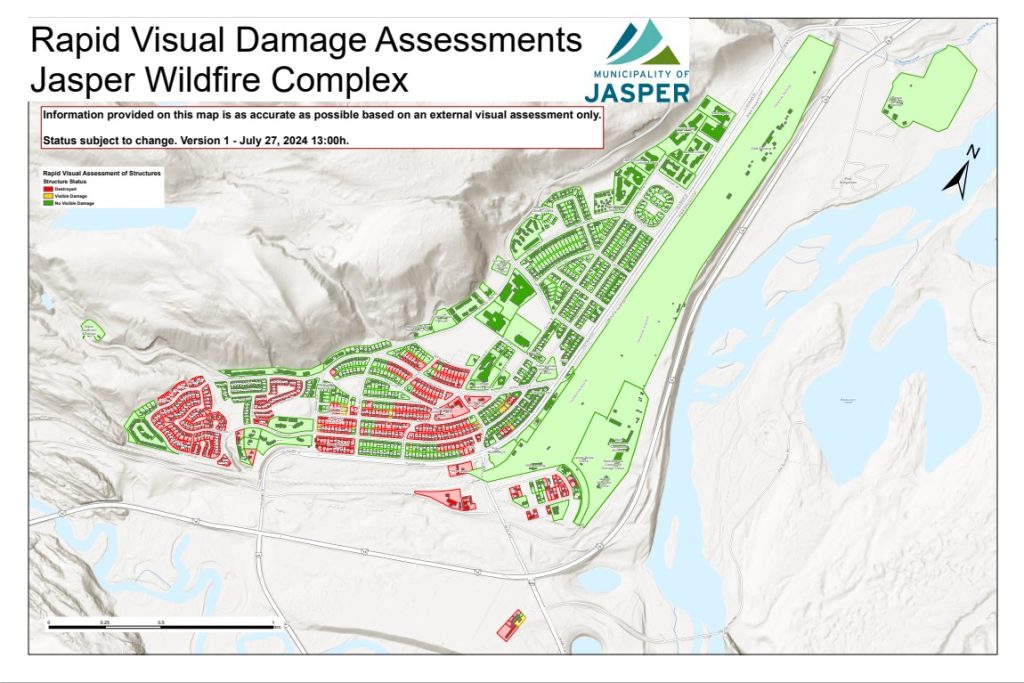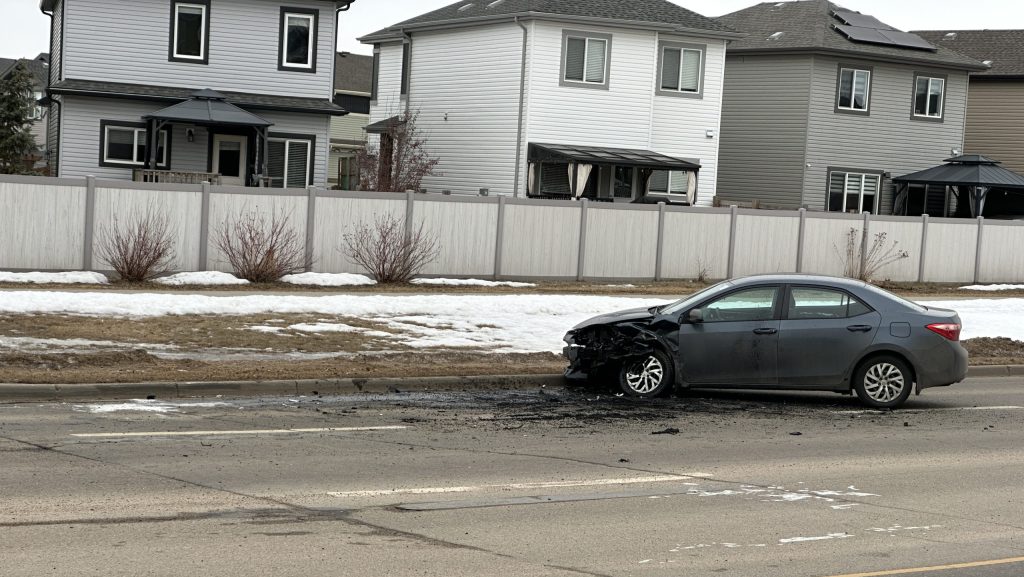Most structures considered destroyed in ‘largest fire’ in Jasper National Park

Posted July 27, 2024 1:21 pm.
Last Updated July 28, 2024 8:28 am.
Parks Canada says most structures in Jasper that faced the largest wildfire to hit Jasper National Park in over 100 years are destroyed while very few are considered damaged.
Christina Nadon, the incident commander for the town says it will be releasing a map and a list of destroyed and damaged residences and businesses.
She says this is still preliminary and might change. The list can be found online here.

“We realize that some residents may have preferred to receive this information privately. Unfortunately, in order to release this information quickly and efficiently, it will be made public for all to see this afternoon,” she told reporters in Hinton.
She says there may be additional damage to homes and businesses that aren’t visible from the street.
After Premier Danielle Smith said in her morning show that she would like to see a bus take Jasperites to the town to assess the damage and collect belongings, Nadon says this isn’t possible because the “townsite is not safe.”
She says the chemicals released from structural fires are a serious risk to health, and there is still an active wildfire on the perimeter of town and firefighters need the space to work safely.
“We recognize that this is a traumatic and stressful time for Jasper residents. Many of you will have your worst fears efficiently confirmed today,” she said.
“As residents, we are still coming to terms with what has happened. We will all need time to grieve our losses. But remember that we are a strong community and Jasper will recover from this wildfire. Reach out to your friends reach out to your neighbors and support each other. We have a long road ahead, but we will get through this together.”
However, Nadon, whose home was also destroyed in the fire, didn’t rule out the idea completely should the area become secure, saying Parks Canada is planning for residents to access the town in a structured way.
“We would likely use buses to get them in and at specific times and in specific areas, and for residents to go have a look at their house or where they lived. And that is a plan that we’re working on and we will have it available as soon as we can,” she said.
Rain a boon to fighting largest fire in over 100 years
Parks Canada Deputy Commander Landon Shepherd says rain has been helping firefighters battle the blaze, but adds the Jasper wildfire is still out of control.
He adds this is the largest fire Jasper National Park has seen in over 100 years at over 32,000 hectares, much larger than the wildfire in 2003.
“At this time, we’re not expecting that it’s going to be easy to change the status from out of control to being held. But that’s what we’re working on on a prioritized basis,” he said.
“And we’re not working alone. And we haven’t been working alone from the very beginning. We always rely on our partners, just like our partners rely on us.”
He says the three fires in the south of the park merged into one fire, along with battling one to the north.
Shepherd says firefighters will be fighting the wildfire for the next three months, adding the wildfire season in Jasper lasts well into the fall.
“So we’re gearing up for a long struggle with making sure that we return everything to as good a condition so that the forest which will naturally recover and always does, it is going to look after itself in a lot of areas,” he said.
“But making it so that it’s that special place that everybody wants to come back to.”
Shepherd says despite the increased rain, fire activity is expected to pick up.
“Starting today, we expect over the next couple of days things are going to recover back a little bit more towards where they were. For the last couple of weeks, but not in the same extreme conditions that we had on the day of impingement,” he said.
Increased heat may lead to higher wildfire danger
Alberta wildfire officials also said Saturday that rain has helped with the wildfires burning around the province, but an upcoming spike in the heat may lead to increased “wildfire danger.”
Melissa Story, the provincial wildfire information officer with Alberta Wildfire, says they recorded over 100 millimetres of rain in some areas over the past 72 hours.
“While it’s not enough to put out fires, it is helping with our operations,” she said.
She also says the weather will be scattered in the coming days, and wildfire danger in parts of southern Alberta remains “extreme,” which means a wildfire can start and spread easily.
“Scattered showers are possible over the western boreal this afternoon (Saturday). Along with that comes the potential for lightning,” she said.
Stephen Lacroix with the Alberta Emergency Management Agency (AEMA) says increased temperatures are expected in the coming week, which Story says comes with an “increase in the wildfire danger,” adding a fire ban for the forest protection area of Alberta remains in place.
“This is a critical point in our wildfire response, and our collective actions matter. So I’m asking all Albertans to remain vigilant and to follow all fire bans and restrictions to minimize fire starts,” Lacroix said.
Officials say 150 wildfires are burning in Alberta’s protected forests, down from 163 the night before.
Forty-three are burning out of control, 47 are being held, and 60 are under control.
In addition, there are seven mutual aid wildfires Alberta Wildfire is assisting with, which means it is not the lead agency of the response. This includes the Jasper wildfire.
During the update, Lacroix said there is misinformation floating around regarding the Jasper wildfire.
As a result, the Alberta government will host a town hall meeting for residents at 6:30 p.m. on Monday, July 29.
“Albertans are invited to join the town hall to get updates on the wildfire situation and answers to any questions you may have,” he said.
More information for evacuees and on the town hall can be found online.
This comes after Parks Canada estimated 30 per cent had been damaged by the wildfire, with 358 of the 1113 structures in the town of Jasper being destroyed.
The mayor of Jasper’s home and the well-known Maligne Lodge were among the properties.
Over 20,000 people in and around the town nestled in the Rocky Mountains four hours west of Edmonton were ordered to evacuate late Monday night due to fast-moving wildfires.
Alberta officials say 17,100 evacuees are spread throughout the province.
With files from The Canadian Press








